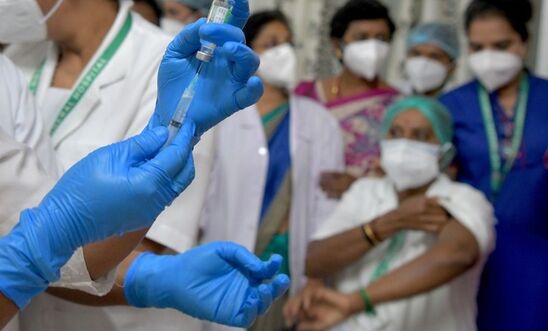
Press releases
COVID-19: Global 'Fair Shot' campaign launched to combat vaccine nationalism

Pharmaceutical companies’ restrictive patents denying vaccines to poorer countries
Rich countries have bought up more than half of all vaccines despite comprising 16% of global population
‘When it comes to… health, there’s no place for discrimination’ - Stephen Cockburn
Billions of people are unlikely to receive a single dose of life-saving COVID-19 vaccine this year because of the actions of pharmaceutical companies and rich countries, Amnesty International said today (11 March) as it launched a new campaign calling for universal access to vaccines.
The campaign, A Fair Shot: Universal Access to COVID-19 Vaccines, calls for pharmaceutical companies - including AstraZeneca, Pfizer, BioNTech and Moderna - to share knowledge and technology to maximise the number of doses of vaccines available around the globe.
It also calls on countries to stop engaging in “vaccine nationalism” and instead work together to ensure that those most at risk of COVID-19 can access life-saving preventative treatment immediately.
Rich countries have already bought up more than half the world's vaccine supply, even though they represent just 16% of the world’s population. To date, the same countries have administered more than 60% of the world’s doses, while more than 100 countries are yet to vaccinate a single person. Recent analysis has also revealed that at least 17,000 health workers have died from COVID-19 in the past year.
While taxpayers’ money has been spent to help companies like AstraZeneca, Moderna and Pfizer BioNTech develop and produce vaccines, these and other companies refuse to share their research, knowledge and technology. This means that other pharmaceutical companies cannot draw upon scientific advances to step up their own vaccine production, which would increase supply and help countries with smaller budgets.
Last May, the World Health Organisation set up the COVID-19 Technology Access Pool (C-TAP) scheme so companies could pool data and knowledge, and then license production and technology transfer to other potential producers with the aim of ensuring people everywhere could access vaccines quicker. So far, not a single pharmaceutical company has joined the data-pooling scheme.
Amnesty is insisting that governments fulfill their human rights obligations and waive certain provisions of the TRIPS agreement, a global treaty governing intellectual property rights which often restricts where, when and how medicines are produced. This waiver would lift the enforcement of patents and intellectual property restrictions that create significant obstacles for additional manufacturers to produce more COVID-19 vaccines. However, while the proposal to relax vaccine patent restrictions is supported by the vast majority of low- and middle-income countries, it is opposed by wealthy ones.
Stephen Cockburn, Head of Economic and Social Justice at Amnesty International, said:
“Who gets access to a COVID-19 vaccine, when, and at what price, are some of the most significant and contested questions facing our societies today. But the answers are being shaped by the interests of powerful states and companies.
“So far they’ve created a dangerous situation with global inequalities in vaccine access spiraling out of control. A few rich countries are racing ahead, while the rest of the world struggles to get off the starting line.
“Everyone deserves a fair shot at a vaccine - when it comes to our right to health, there’s no place for discrimination.
“Nobody should be denied access to health care, including vaccines, because of where they live, who they are, or what they earn. With enough pressure on the right people, we can ensure COVID-19 vaccination systems guarantee human rights.”
Tamaryn Nelson, Amnesty International’s Health Advisor, said:
“As we mark the one-year anniversary of the declaration of the COVID-19 pandemic, we cannot stand by and watch this tragedy unfold when we have solutions on the table.
“Amid governments’ race to vaccinate their own populations entirely first and the pharmaceutical industry’s tight grip on its patents, we’re forgetting that people’s lives are at stake. No one is safe until we’re all safe.”